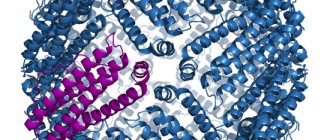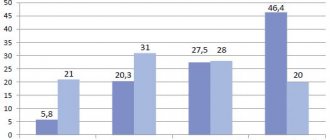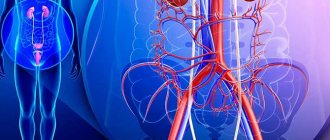With the help of prolactin, breasts form and grow (the hormone is also responsible for the development of ducts), and milk is produced after the baby is born. In addition, ovulation depends on prolactin. The hormone is involved in the regulation of progesterone production: its increase leads to a decrease in progesterone production and, as a result, to a slowdown in ovulation processes.
During pregnancy, prolactin levels increase significantly. This is a normal process. After childbirth, during lactation, it remains high (although compared to pregnancy, of course, it falls). This explains the very low chance of pregnancy during breastfeeding. But still, if the cycle is restored, breastfeeding cannot be considered a reliable method of contraception.
Outside of pregnancy, prolactin levels fluctuate depending on the day of the menstrual cycle. A strong and sustained increase that is not associated with bearing or feeding a child has a negative effect on the body. This condition is called hyperprolactinemia.
Norm prolactin in women
| Cycle phase | Normal prolactin concentration |
| Follicular (approximately 1-13 days) | From 4.1 to 30 ng/ml |
| Ovulatory (approximately day 14) | From 6.5 to 50 ng/ml |
| Luteal (approximately 15-28 days) | From 5 to 41 ng/ml |
The prolactin norm for expectant mothers and nursing women is much higher. The level of the hormone begins to increase in the first trimester and reaches its peak in the third. During this period, the normal concentration is up to 318 ng/ml. Moreover, even if the prolactin level goes beyond this limit, this does not indicate the presence of pathology. Pregnant women generally do not need to worry about these indicators.
Causes of increased prolactin.
The causes of hyperprolactinemia can be organic in diseases of the pituitary gland or functional in diseases of other organs. Lesions of the pituitary gland lead to a large increase in prolactin levels. The cause of organic hyperprolactinemia is most often a pituitary microadenoma, and its concentration can exceed 2000–4000 mIU/l. Functional hyperprolactinemia can appear as a reaction to prolonged and severe stress. A short-term increase in prolactin levels, usually without clinical manifestations, is called transient hyperprolactinemia. This condition may be associated with disturbances in sleep, sexual intercourse or eating. In some cases, doctors cannot determine the cause of increased prolactin levels.
Elevated prolactin levels - symptoms, causes, consequences
The limits of the norm are quite wide for women who are not pregnant or breastfeeding. From time to time, prolactin may rise above the upper level, and this does not necessarily indicate serious problems in the body. The level of the hormone can fluctuate due to emotional stress, taking certain medications, and other external physiological factors.
But a persistent and significant excess of the norm outside of pregnancy and breastfeeding is a cause for concern. You can suspect him based on the following signs:
- cycle disturbances up to the cessation of menstruation;
- vision problems (decreased visual acuity);
- discharge from the mammary glands;
- engorgement of the mammary glands, their enlargement;
- headache;
- decreased sexual desire;
- weight gain with normal physical activity and diet.
These signs do not give grounds to assert the presence of hyperprolactinemia. But if you find them in yourself, be sure to go to a gynecologist-endocrinologist.
Treatment of the condition
Before treatment, it is important to find out whether the change in the amount of the hormone is physiological or pathological. To do this, the doctor will prescribe monitoring of indicators. In addition, anamnesis helps to establish the true cause of the changes. If a hormonal surge was preceded by intense physical activity, active sports, or psycho-emotional shock, then we can talk about a temporary imbalance that the body compensates on its own.
If we are talking about pathological processes, then an endocrinologist knows how to lower prolactin in men. At the clinic Dr. AkNer you will be able to undergo a comprehensive examination and treatment. If necessary, an andrologist and a reproductologist will be involved in therapy.
If the problem is caused by pathologies of internal organs (kidneys, liver, thyroid gland), consultations with relevant specialists will be required. If an adenoma or tumor of the pituitary gland is detected, the help of an oncologist is necessary.
In most cases, compensation for elevated prolactin in men is performed with medication. For correction, antiprolactin therapy is individually developed in each case. It requires constant monitoring of hormone levels under the supervision of a specialist.
A woman has elevated prolactin - possible causes
There are many factors that can cause increased production of the pituitary hormone:
- Benign tumors of the pituitary gland (prolactinomas and adenomas).
- Hypothyroidism (low thyroid function).
- Polycystic ovary syndrome.
- Kidney diseases (CKD) and liver.
- Dysfunction of the adrenal cortex.
- Constant stress.
- Brain pathologies.
What can hyperprolactinemia lead to?
Constantly high prolactin does not just signal pathologies. Hyperprolactinemia is fraught with the development of other disorders. Excessive production of the hormone is fraught with disruptions in the functioning of the reproductive system.
Due to increased prolactin, the cycle becomes irregular, the process of maturation and release of eggs is disrupted, and the production of follicle-stimulating hormone is reduced. The consequence of these changes may be infertility.
Other negative consequences of hyperprolactinemia are also possible: decreased vision, memory impairment, problems with sleep and emotional state.
Reasons for changes in indicators
The norm of prolactin in men is in the range of 86-324 µIU/ml and depends on the time of day. So, in the evening and before bedtime, the prolactin content is minimal, the highest level is observed immediately after waking up.
Changes in prolactin levels can be caused by stress, physical activity, and intense sexual activity. In such cases, hormone surges are compensated by the body itself.
Prolactin is elevated in a man, what does this mean – many clinic patients ask. Since the hormone is involved in many life processes, fluctuations in its level can be a signal of serious diseases.
- Disturbances in the functioning of the pituitary gland.
- Benign or malignant neoplasm of the pituitary gland.
- Lack of vitamin B6.
- Disturbances in the functioning of the hypothalamus.
- Cirrhosis of the liver.
- Autoimmune disease.
- Kidney failure.
- Malfunction of the thyroid gland.
A decrease in the level of the hormone in the blood can be observed while taking anticonvulsants or during infectious diseases. Also, the body sometimes reacts to x-ray therapy in a similar way.
Diagnosis of hyperprolactinemia
It is impossible to determine elevated prolactin based on symptoms. The only way to detect excessive hormone production is a blood test. The sample is taken from a vein in the morning. The patient is advised to be in a calm state of mind at this time.
The analysis is done three times, because it is necessary to establish the level of prolactin in different phases of the cycle. In addition to studying the hormonal profile, additional tests are used in diagnosis. If hyperprolactinemia is confirmed, a gynecologist-endocrinologist may refer for mammography or magnetic resonance imaging of the brain.
The effect of prolactin on the body.
The biological function of prolactin is to support childbirth; its main effect is the formation and regulation of lactation. The hormone is involved in the formation of the mammary glands, promoting the growth of the milk ducts during pregnancy and adolescence. Prolactin stimulates the production of breast milk and promotes natural feeding of children. The effects of prolactin on the body are not limited to the mammary glands. It affects the pancreas and thyroid gland, adrenal glands, and ovaries. In the adrenal glands, prolactin increases the production of adrenaline, norepinephrine, cortisol, androgens, and aldosterone. All these hormones help a nursing woman more easily endure emotional and physical stress. Under the influence of this hormone, the functioning of insulin-producing cells in the pancreas increases, so that the nutrients entering the body are used as fully as possible. The effect of prolactin on the thyroid gland reduces the synthesis of calcitonin, and therefore increases the content of minerals in breast milk. The ovaries are especially sensitive to prolactin. High concentrations of the hormone inhibit ovulation and cause menstrual irregularities. Prolactin regulates the functioning of the immune system, allowing the fetus to develop in the uterus without a rejection reaction. Prolactin in high doses suppresses libido and is also involved in the onset of orgasm. An increase in prolactin levels in the body occurs during pregnancy and breastfeeding; this is necessary for the birth and normal development of the child.
Treatment of hyperprolactinemia
Treatment methods for hyperprolactinemia depend on what causes led to increased prolactin in women. If the cause of the disease is pituitary tumors, then it is necessary either to prescribe drugs that reduce the size of the tumor, or to remove it surgically. For this purpose, microsurgical techniques are used using a laser scalpel or cryodestructive technologies. If computed tomography confirms that there is no pathology in the area of the sella turcica, then dopamine agonist drugs are prescribed, which reduce the concentration of prolactin in the blood. The oldest of them is bromocriptine. It stimulates specific receptors in the cerebral cortex, which seriously inhibits the production of prolactin. The level of the latter is rapidly decreasing.
The menstrual cycle is restored as a result of bromocriptine therapy individually for each woman: sometimes after eight weeks, sometimes after eight months after the start of treatment. In some patients, hormone levels return to normal even after a few days. The dose is selected individually. Treatment continues until the menstrual cycle normalizes. To prevent relapse of the disease, bromocriptine therapy is carried out over several cycles. However, the drug has side effects such as constipation, nausea, vomiting, dizziness, headache, dry mouth and fatigue. The side effects of the second generation of drugs, which include Norprolac, are less pronounced.
This drug is very convenient because it only needs to be used once a day. Its minor side effects do not interfere with treatment at all. Dostinex belongs to the third generation of dopamines. This is a long-acting drug. When taking it, prolactin decreases as much as possible after two to three weeks. It is taken only once a week. The active substance is quickly absorbed into the blood, which allows you to get rid of nausea and vomiting.
If the cause of increased prolactin in a woman is a pathology of the thyroid gland, then the administration of hypothyroid hormones can normalize prolactin levels. Particular attention is paid to the treatment of hyperprolactinemia if pregnancy has already occurred, since an increase in the hormone can provoke spontaneous abortion. If the cause of the disease is prolonged stress, treatment is carried out together with a psychologist.
If elevated prolactin is detected in a woman, the consequences of which frighten her, contact the Tambov IVF Center. We will offer you to undergo diagnostics using the most modern methods, based on the results of which we will prescribe an individual treatment program. Don't wait for elevated prolactin in women to cause irreversible consequences.
How to prepare for a prolactin test
Preparing for the study:
- We recommend donating blood between 8 and 11 am;
- blood must be donated on an empty stomach, after an 8-12 hour overnight fast;
- on the eve of the study - a light dinner with limited intake of fatty foods;
- on the day of the test, you can drink still water and it is better to avoid coffee and tea;
- 24 hours before the test, exclude alcoholic beverages;
- 1 hour before the test it is better to refrain from smoking;
- 24 hours before the study, exclude the use of medications (in consultation with the attending physician);
- 24 hours before the test, eliminate emotional and physical stress;
- You should not donate blood after radiography, ultrasound, massage, endoscopic and physiotherapeutic procedures;
- It is recommended to rest for 10-20 minutes before donating blood.
Indications for prescribing the study
Venous blood testing for prolactin is prescribed for:
- signs of prolactinoma (benign tumor of the anterior lobe of the pituitary gland): headaches, blurred vision, infertility, discharge of milk-like fluid from the nipples;
- control of prolactinoma treatment;
- determining the cause of menstrual irregularities, infertility, sexual dysfunction, lumps and pain in the mammary glands;
- comprehensive examination of pregnant women with suspected post-term pregnancy;
- insufficient lactation in nursing mothers.
A blood test for prolactin will be incorrect in case of acute inflammation, immediately after chest injuries.
PROLACTIN - WHAT IS IT?
Prolactin (PRL) is a hormone that primarily affects the functioning of the mammary glands. The main function of prolactin is to ensure normal lactation. Prolactin is considered a fertility hormone because its effect on the body is directly related to the ability to reproduce.
Prolactin is also called lactotropic, lactogenic, luteotropic, mammotropic hormone or mammotropin. In Latin, its name sounds like Prolactinum, in English Prolactin or Luteotropic hormone, in the literature you can find its abbreviations PRL and LTH. Prolactin is produced in a special place in the brain called the pituitary gland. The pituitary gland also produces many other hormones, such as thyroid-stimulating hormone, follicle-stimulating hormone, and growth hormone.
The amount of prolactin in the blood varies throughout the day because the pituitary gland produces prolactin irregularly. Before bedtime, in the evening and at night, the hormone content decreases significantly, and during sleep the hormone level increases progressively. The highest level of prolactin can be recorded in the morning, so it is recommended to take a blood test to determine the amount of this hormone a few hours after waking up.
Certain areas of cells in our body that can be affected by prolactin (prolactin receptors) are located in almost all organs. For example, receptors for this hormone can be found in the heart, lungs, liver and spleen, kidneys and adrenal glands, muscles and skin, brain and spinal cord, as well as in the male and female genital organs - the uterus, ovaries and testicles. Prolactin is considered essential for the normal regulation of the entire water-salt balance in the body; it helps to delay the release of fluid and various microelements by the kidneys.
It is important that the content of other sex hormones also depends on the amount of prolactin; for example, a significant increase in it in the blood helps to reduce the level of estrogen or testosterone.
Diagnostic measures
It is impossible to determine the hormone level by the presence/absence of the symptoms mentioned above. For this purpose, a venous blood test is performed. The procedure is scheduled for the morning. No special preparation is required for collecting material, but it is advisable to calm down before visiting the laboratory.
Blood tests are carried out 3 times at different stages of the menstrual cycle. If elevated prolactin levels are confirmed in non-pregnant women, the patient is prescribed mammography and MRI of the brain.
Prolactin and the ability to have children
In some cases, high prolactin levels can lead to infertility. Prolactinoma tumors affect the pituitary gland, and it reduces the production of hormones. This condition is known as hypopituitarism. In men, it causes decreased libido and hair loss. In women, this can lead to infertility.
Hyperprolactinemia complicates pregnancy and disrupts the normal production of the hormones estrogen and progesterone. This causes the ovaries to either release eggs irregularly or stop producing eggs completely.
Medicines and other treatments for prolactinoma restore fertility in most women.
What else should I try?
Ways to reduce prolactin levels:
- change your diet;
- try to keep stress under control;
- limit intense exercise;
- Wear comfortable clothes that do not cause chest discomfort or stimulate the nipples;
- Take vitamin B6 and vitamin E – vitamin B6 is involved in the production of dopamine and higher levels can lower prolactin levels, and vitamin E prevents prolactin levels from rising;
- avoid anabolic steroids;
- take zinc supplements.








